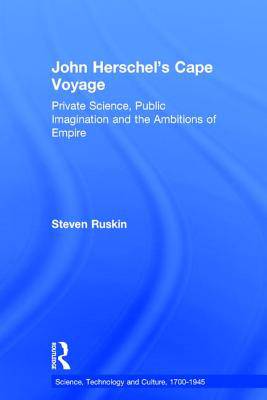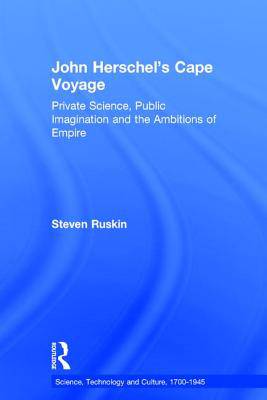
Door een staking bij bpost kan je online bestelling op dit moment iets langer onderweg zijn dan voorzien. Dringend iets nodig? Onze winkels ontvangen jou met open armen!
- Afhalen na 1 uur in een winkel met voorraad
- Gratis thuislevering in België vanaf € 30
- Ruim aanbod met 7 miljoen producten
Door een staking bij bpost kan je online bestelling op dit moment iets langer onderweg zijn dan voorzien. Dringend iets nodig? Onze winkels ontvangen jou met open armen!
- Afhalen na 1 uur in een winkel met voorraad
- Gratis thuislevering in België vanaf € 30
- Ruim aanbod met 7 miljoen producten
Zoeken
John Herschel's Cape Voyage
Private Science, Public Imagination and the Ambitions of Empire
Steven Ruskin
€ 182,45
+ 364 punten
Uitvoering
Omschrijving
In 1833 John Herschel sailed from London to Cape Town, southern Africa, to undertake (at his own expense) an astronomical exploration of the southern heavens, as well as a terrestrial exploration of the area around Cape Town. After his return to England in 1838, and as a result of his voyage, he was highly esteemed and became Britain's most recognized man of science. In 1847 his southern hemisphere astronomical observations were published as the Cape Results. The main argument of Ruskin's book is that Herschel's voyage and the publication of the Cape Results, in addition to their contemporary scientific importance, were also significant for nineteenth-century culture and politics. In this book it is demonstrated that the reason for Herschel's widespread cultural renown was the popular notion that his voyage to the Cape was a project aligned with the imperial ambitions of the British government. By leaving England for one of its colonies, and pursuing there a significant scientific project, Herschel was seen in the same light as other British men of science (like James Cook and Richard Lander) who had also undertaken voyages of exploration and discovery at the behest of their nation. It is then demonstrated that the production of the Cape Results, in part because of Herschel's status as Britain's scientific figurehead, was a significant political event. Herschel's decision to journey to the Cape for the purpose of surveying the southern heavens was of great significance to almost all of Britain and much of the continent. It is the purpose of this book to make a case for the scientific, cultural, and political significance of Herschel's Cape voyage and astronomical observations, as a means of demonstrating the relationship of scientific practice to broader aspects of imperial culture and politics in the nineteenth century.
Specificaties
Betrokkenen
- Auteur(s):
- Uitgeverij:
Inhoud
- Aantal bladzijden:
- 262
- Taal:
- Engels
- Reeks:
Eigenschappen
- Productcode (EAN):
- 9780754635581
- Verschijningsdatum:
- 26/03/2004
- Uitvoering:
- Hardcover
- Formaat:
- Genaaid
- Afmetingen:
- 156 mm x 233 mm
- Gewicht:
- 452 g

Alleen bij Standaard Boekhandel
+ 364 punten op je klantenkaart van Standaard Boekhandel
Beoordelingen
We publiceren alleen reviews die voldoen aan de voorwaarden voor reviews. Bekijk onze voorwaarden voor reviews.











